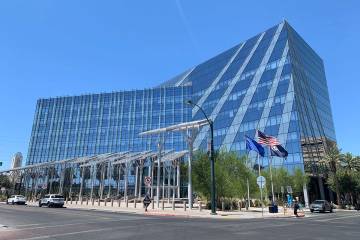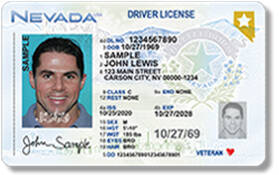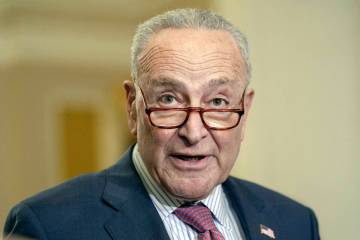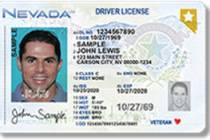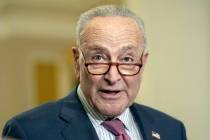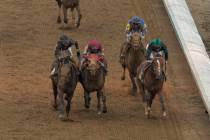Obama’s gaming give, take
Democratic presidential candidate Barack Obama enjoys poker and blackjack, and admires the way the gaming industry powers Nevada's economy.
But in his home state, it's a different story. As a matter of principle, he repeatedly opposed expanding gambling in Illinois, saying it was bad for communities and not a good way to fund government.
As recently as 2003, Obama, then an Illinois state senator, said he believed the "moral and social cost of gambling" was potentially "devastating" and that using gaming as a source of revenue or for economic development was "irresponsible."
He didn't think Illinois legislators should accept political contributions from the gaming industry, and in 2004 and 2006 refused federal contributions from gaming companies.
Today, it's a different story: He's the U.S. Senate's No. 10 recipient of gaming donations, backed in Nevada by such industry insiders as Billy Vassiliadis and Elaine Wynn, and actively seeking the support of the gaming-dependent Culinary union.
Obama's campaign says there is no inconsistency because he believes states should regulate gambling. As an Illinois state senator, he objected to the way the state regulated the industry. In Nevada, he believes regulation has been done right. And as a federal lawmaker, he doesn't have an oversight role.
However, in simple terms, Obama was an antagonist of the gaming industry when he was an Illinois legislator. Now, as a federal lawmaker and presidential candidate, he is its friend, although it is a friendship on uneasy terms.
He is not the only candidate with a mixed record on the industry that, while frowned upon in churches, is the sine qua non of Nevada's economy.
Among his rivals for the Democratic presidential nomination, former North Carolina Sen. John Edwards was a co-sponsor of a federal bill to ban betting on college sports. Edwards now says that if elected he wouldn't press for a ban.
For her part, New York Sen. Hillary Clinton hasn't taken a position on the current debate over whether Internet gambling should be legalized.
To say Obama has become a proponent of gaming would be too strong. In fact, he has, when pressed, stood by his views that casinos aren't a good way for governments to generate revenue or for communities to improve economically.
Asked about gaming by The Associated Press in March, he said it was "something I continue to be concerned about." Pressed on the issue on the Las Vegas television show "Face to Face with Jon Ralston" in June, he expressed his love for poker and blackjack, but said when it comes to state revenue, "I just believe in paying for government services the old-fashioned way."
This goes against the gaming industry's view, and it's not something he mentions when he campaigns in Las Vegas. But it is perhaps in keeping with a candidate who prides himself on putting principle above politicking and who won't just do or say anything to get elected.
However, when it comes to gambling's impact on communities, Obama has, if not reversed, clearly softened his position.
He told the AP he believes there is "certainly a potentially moral and social cost to gambling, if it's not properly regulated, if children have access to it." Nevada, he said, could be proud of the way it used gaming as a "very successful economic model."
That's a less severe stance than Obama expressed in a May 2003 article in the Chicago Defender newsletter.
"I think that the moral and social cost of gambling, particularly in low-income communities, could be devastating," he was quoted as saying.
Obama wasn't pushing for more regulation. Rather, he was arguing against more gambling in his state.
In 2003, he voted in favor of a bill supported by the gaming industry that loosened some regulations on riverboats. His campaign says it wasn't a reversal because the bill didn't create any new casinos.
In a 2002 candidate survey from the anti-gambling Illinois Churches in Action, Obama said he was opposed to increasing the amount of gaming in existing casinos, slot machines at racetracks, video gaming at drinking establishments and additional riverboat casinos.
"I think it's a bad idea," he told the Defender in February 2001, talking about a bill to add slot machines. "I am generally skeptical about the steady expansion of gambling in Illinois and the use of gaming as an economic development tool."
Illinois has for decades had betting at horse racetracks and a lottery. But the gaming industry, as in casino operators, entered the state in 1991, when riverboat gambling was legalized.
The state said there would be just 10 gambling boats and they would go to communities that could prove they needed a boost. Gambling would be allowed only while the boats were cruising; Cook County, which contains Chicago, and Lake Michigan were ruled out as locales.
"If you look at who invested in the boats, it's clear people expected it (gambling) would evolve into something much more," said Kent Redfield, a political scientist at the University of Illinois in Springfield who studies Illinois politics. Many of the investors were big, Las Vegas-based gaming companies such as Harrah's and Mirage Resorts.
"It was pretty dormant until the 1999 session," Redfield said.
That's when the industry mounted a massive lobbying effort and legislators from both political parties cobbled together a bill -- stuffed with pork projects to get lawmakers on board -- that eliminated the cruising requirement and the ban on Cook County casinos.
The bill passed. Obama (to whom Redfield acknowledges he is "favorably disposed" because they worked together on campaign-finance legislation) voted against it, saying at the time that the loosening of restrictions was a "race to the bottom" and that campaign contributions from gaming interests played a role.
There are no limits on contributions in Illinois. Gaming gave legislators more than $1 million and the governor more than $400,000 in the run-up to the 1999 legislative battle, Redfield's research found.
Obama refused money from gaming, telling National Public Radio, "It is very hard to separate yourself from the interests of the gaming industry if you're receiving money."
Redfield said Obama's stance was in line with the position of urban anti-poverty and other community groups.
"Basically, the argument that it's disruptive to communities, it's regressive and that it's not good public policy, I think that was a sincere position for him," Redfield said.
Some of those community groups might be a little disappointed to see their man now holding fundraisers in Las Vegas casinos and taking tens of thousands of dollars from people in the gaming industry, Redfield said.
"This is a dilemma when you've got a political system where money is an important component. You can't make good public policy if you can't get elected. You make trade-offs. Insofar as he's come to terms with the industry, voters have to judge if somebody's making too much of an accommodation in order to get elected."
Not making accommodations for moneyed interests is a major theme of Obama's campaign. For his presidential run, he ceased accepting contributions from federal lobbyists and political action committees, saying it's necessary to be free from their influence.
An anti-gambling crusader who considered Obama a friend of his cause in Illinois is suspicious that's what's happening.
"When he was a new state senator, he appeared on our local public affairs (television) show and said, 'I really don't think a lottery is a good idea. I'm troubled by it,'" said Tom Grey, founder of the National Coalition Against Legalized Gambling.
Grey started his group in Illinois in reaction to the riverboats. It eventually became essentially the only national group dedicated to stopping what he calls "the tsunami" of gambling expansion.
"I filed that away and said, 'That's interesting. He's an up-and-comer,'" Grey said. "Then, in 1999, that was the big vote and he voted against gambling expansion. He was on the high ground on that."
Grey said most federal candidates dismiss gambling as a state's rights issue to avoid having to take a stand on it, but he said they should have to answer three questions: Should Internet gambling be legal? Should Indian tribes be allowed to build casinos outside their reservations? And should gaming be allowed to make political contributions?
Grey believes the answer to all three should be no.
Obama's campaign says he accepts gaming-connected contributions now because, with gaming largely regulated at the state level, it's no longer a conflict of interest.
But the campaign didn't explain why those contributions weren't welcome at the federal level when he was collecting money in 2004 and 2006. And as Grey points out, there are still regulatory issues at the federal level.
Obama's campaign said he believes tribal gaming should be decided on a case-by-case basis with consideration for the wishes of the states involved, and that the government should "bring (Internet gaming) under regulatory control to stop the worst abuses" -- that is, make it legal.
Grey said he believes Obama is doing what he has to do to be a viable candidate, just like any other politician.
Grey disagrees with the idea that expanding gaming is a good way for states to bring in tax dollars. He pointed to Nevada's current budget woes as an example of the danger of relying on taxes from gaming.
"If he says it's economic development, it's harmless, it's entertainment like shopping or the movies -- then I'm going to be really upset," Grey said. "That would really be a gigantic flip-flop."
That view is the gaming industry's position, but it is not Obama's.
"Barack Obama knows that gaming has been a major engine of growth for Nevada," spokeswoman Gilson said.
But, he also "believes gaming is an issue that impacts all communities differently. ... Nevada is unique. Las Vegas communities were built around tourism and gaming, and as a result, the state has mature regulatory structures. We can't ignore that putting gaming in low-income areas can have a negative effect on low-income families."
The 60,000-member Nevada Culinary union, whose endorsement the Democratic candidates have ardently sought, doesn't have a position on gaming per se, but "we're generally supportive of the expansion of gaming when it provides jobs," the union's political director, Pilar Weiss, said.
Culinary's sister union in Chicago, Local 1 of UNITE HERE, plans to endorse along with Culinary next month. The local's membership includes about 1,200 gaming workers, said its president, Henry Tamarin.
The union supports expanding gaming because it would create jobs, he said. Another legislative battle over expanding gaming is currently under way in the Illinois legislature; Obama does not support it.
Vassiliadis, the Nevada Democratic power broker and lobbyist for the Nevada Resort Association, the casinos' trade group, said he had no misgivings about Obama.
"Gaming is a state issue. It has consistently been a state issue," he said. "I am aware that he had concerns about how gaming had been regulated, executed, controlled in the state of Illinois. I am also aware that he has said that Nevada is a regulatory model that he has a lot of regard for."
The executive director of the Illinois Casino Gaming Association, Tom Swoik, said casinos in the state employ 10,000 people and pay the state $800 million per year in taxes.
With a graduated gross tax rate that tops out at 50 percent, Illinois has by far the highest gaming tax in the nation. The state in 2003 raised the top rate to 70 percent, but workers were laid off and revenues began to decline, and the rate is being phased back down.
"It's been such an unstable business environment in this state that a lot of companies don't want to deal with it," Swoik said. "If you're a casino operator in Illinois, you've got a 50 percent tax rate and you never know when it might change."
American Gaming Association President Frank Fahrenkopf, a Nevadan and former Republican National Committee chairman, wasn't surprised or distressed by Obama's uncomfortable relationship with gaming, an industry that, he likes to point out, asks mostly just to be left alone.
"Most of the candidates will say they're personally against gaming on moral grounds, but they believe in state's rights," he said. "Therefore, if a state has made the decision, it's fine with them. George Bush had the same view when he was running for president."
Contact reporter Molly Ball at mball@ reviewjournal.com or (702) 387-2919.
2008 ELECTIONSGet more news, voter information




